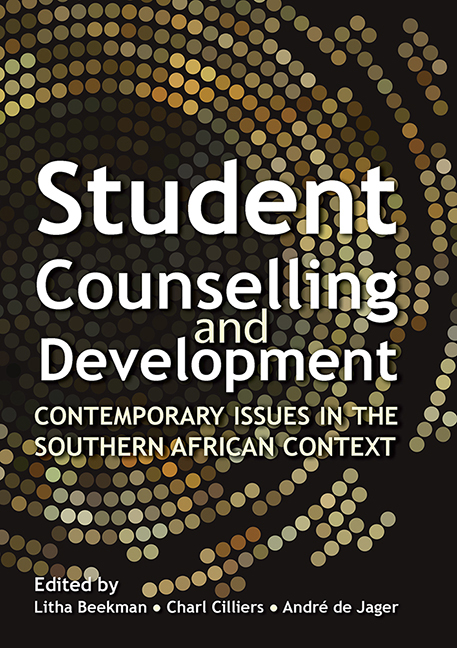Book contents
- Frontmatter
- Contents
- Figures
- Tables
- Preface
- Section 1 Development of Student Counselling and Development in Southern Africa
- Section 2 Theoretical Foundations of Student Counselling and Development in Higher Education
- Section 3 Services and Programmes Provided by Student Counselling and Development Units
- Section 4 Student Counselling and Development For Special Groups
- Section 5 Quality Assurance and Ethical and Professional Issues
- Contributors
- Index
Chapter 4 - Theoretical Framework For Student Counselling and Development in Higher Education
Published online by Cambridge University Press: 22 February 2020
- Frontmatter
- Contents
- Figures
- Tables
- Preface
- Section 1 Development of Student Counselling and Development in Southern Africa
- Section 2 Theoretical Foundations of Student Counselling and Development in Higher Education
- Section 3 Services and Programmes Provided by Student Counselling and Development Units
- Section 4 Student Counselling and Development For Special Groups
- Section 5 Quality Assurance and Ethical and Professional Issues
- Contributors
- Index
Summary
INTRODUCTION
Students entering higher education (HE) need to understand and cope with the transition from school to HE and be conscious of the ultimate transition to the world of work. Student counsellors basically try to help them achieve these ends. They assist them to adapt to the HE environment, to perform academically, to deal with their social life and newfound freedom as young adults, and to develop holistically. Student counsellors, in essence, focus on supporting students through the career development phase starting from before entering HE to the point of leaving and taking up employment. Student counsellors also assist adult students who enter HE for the first time or return after years to study further. The increase in adult students is a result of the need for lifelong learning in order to stay relevant in an ever-changing world of work. Many of these students are from previously disadvantaged population groups who have had limited access to HE for historical, economic and political reasons. These students mostly study part-time; have families and demanding jobs; and need to be assisted through their adaptation as “older” adults with their unique work-home-study-life challenges.
The question is how student counsellors can best help students to adapt and develop while moving through the transition phase from school to higher education to the workplace (S-HE-W). How can student counsellors assist students to develop holistically while at HE institutions for the duration of their studies? What will enable student counsellors to effectively support students through this specific stage of career development in their lives? How can student counsellors find the best way to support them during this phase in adapting and handling the challenges and stress accompanying student life within a HE system and preparation for final transition to the workplace? How can student counsellors support “older” adult learners to adapt to the HE system, HE teaching and learning philosophy, a young student population, managing time and living a balanced life between work, study, home, family and community responsibilities?
A further question is how student counsellors see their role, function and practice within the HE system? The epistemology of student counsellors, which refers to what they believe about the nature of knowledge, determines the perspective they have about their own role, functions and counselling practice.
- Type
- Chapter
- Information
- Student Counselling and DevelopmentContemporary issuesin the Southern African Context, pp. 67 - 86Publisher: University of South AfricaPrint publication year: 2012
- 1
- Cited by



